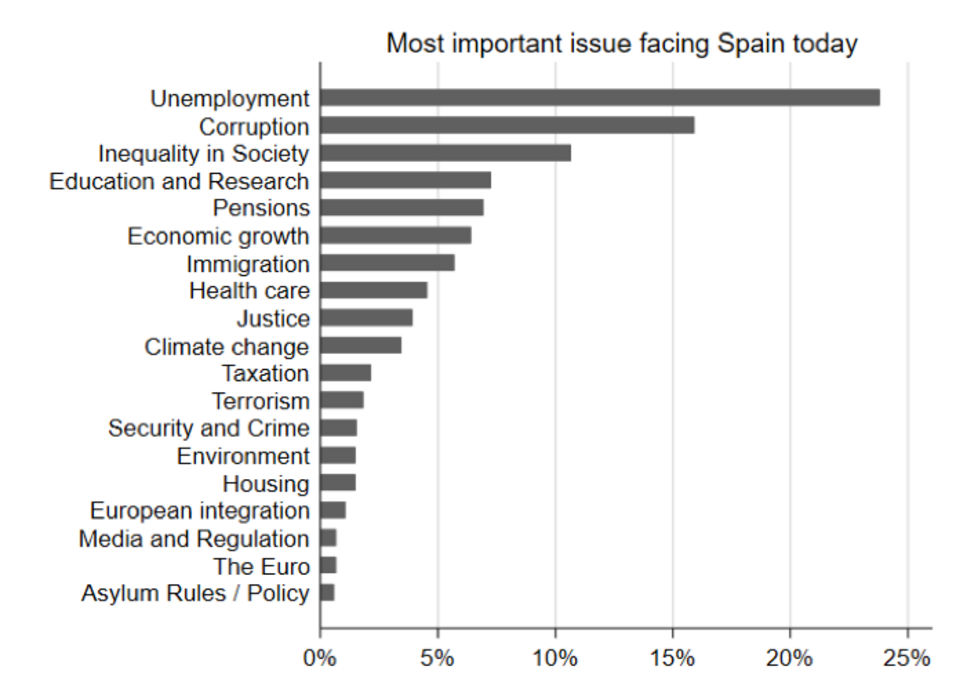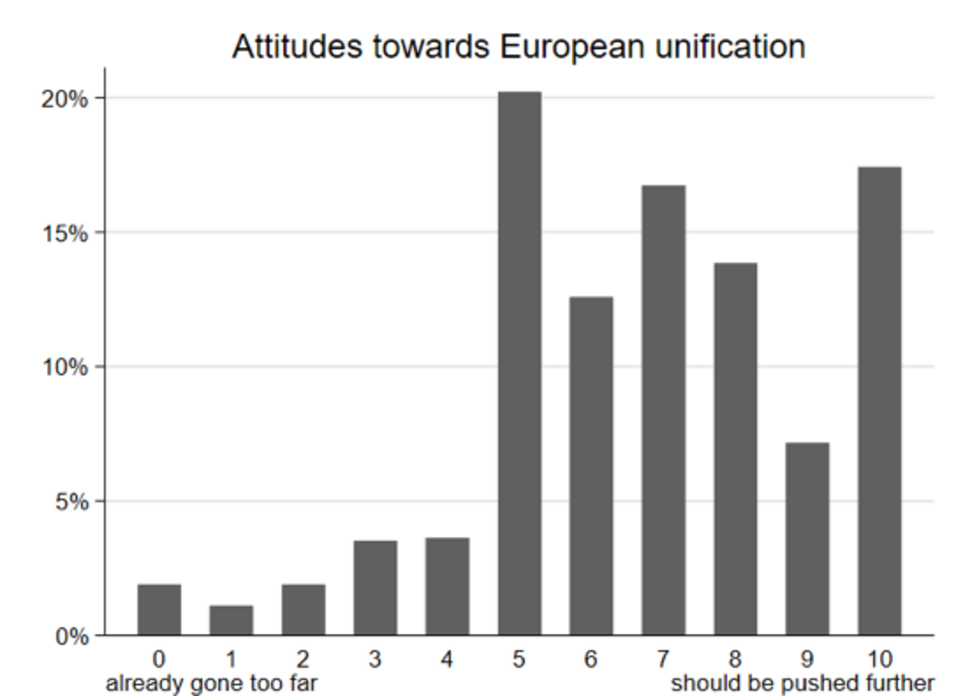by Jose Fernandez-Albertos and James Wilhelm
A Convergence of Elections
A key element affecting the amount of attention that media and parties have dedicated to the European election campaign in Spain, so far, is the concurrence with local elections (throughout the entire country) as well as regional elections (in almost all regions, with the exception of Andalusia, Catalonia, Galicia and Valencia). This has several consequences: first, domestic issues clearly trump European ones in the media; second, citizens who potentially wouldn’t make it to the polling station for a purely European contest may do so; and finally, candidates in the European election are incentivised to differentiate themselves from other (domestic) contests by discussing European issues specifically. Though the EP election is clearly secondary to the local and regional contests, the Spanish media appears to be paying more attention to the European dimension of the debate than it did in the previous European elections. The content of this debate includes discussion over the European social model, including the possibility of developing an EU unemployment insurance scheme; the rise of right-wing nationalist movements across Europe and the consequences of this at the European level; the extension of the European arrest warrant (a hot topic in Spain, as this is linked to the fact that former Catalan president and independence leader Carles Puigdemont has managed to avoid extradition from other EU countries); and climate change as a general theme, without much discussion of policy alternatives. However, it is unclear how much of this specifically European debate will reach the wider, less politically interested part of the population.
The Catalan issue and the political gridlock associated with it continues to ‘contaminate’ all political debates in Spain – even the European election campaign so far. For example, the centrist Ciudadanos party – associated with the Alliance of Liberals and Democrats for Europe group (ALDE) at the European level – will block the nomination of the Commissioner for Justice if he/she does not commit to extending the European arrest warrant. Political discussion is further complicated by the fact that negotiations to form a new government are still ongoing, even though national elections took place in Spain on April 28. A lack of clarity over who will support the Spanish Socialist Workers’ Party (PSOE), the party that won the largest share of the vote (29%, ahead of the right-wing Partido Popular with 17%), dominates the media agenda.
The Important Issues at the Voter Level
Figure 1 shows the most important issues facing Spain today, according to the 2,092 eligible voters in Spain we surveyed prior to the start of the election campaign (interviewed between April 3 and April 15, 2019).[2] Though the level of unemployment in Spain has fallen steadily since the 2013 peak – from 27% to 15% among the general population and from 56% to 34% among young people – our survey reveals that unemployment remains the most important issue amongst our sample of Spanish respondents (24%). Also of major concern in the pre-campaign period are the issues of corruption (16%) and inequality in society (11%). The unemployment issue aligns potential voters in the upcoming European Parliament election in Spain with those in Italy, for whom this issue is also most important, and less so with eligible voters in Germany, Denmark, France, for whom climate change, immigration and concerns about asylum rules and policies are dominant issues. This suggests that the high unemployment levels experienced in some southern EU member states continue to substantially differentiate the issue priorities of their respective electorates from the voters in other EU countries in the run-up to Election Day.
A Pro-Integration Electorate
Figure 2 shows where our sample of Spanish respondents placed themselves on a 0-10 point European unification scale, where 0 indicates that European unification has already gone too far, and 10 that it should be pushed further.[3] A large majority of Spanish respondents agree that European unification should be pushed further, which is consistent with the historical pattern of Spain as one of the most pro-integration Member States within the European Union. In fact, only 13% of eligible Spanish voters in our survey expressed the view that European integration has gone too far, compared to 68% of respondents who think the project of European integration should be pushed further. This pro-integration disposition makes the Spanish respondents we surveyed more supportive of European unification than those in any other country in which we ran our survey: namely Denmark, France, Germany, Hungary, Italy and Poland. Our survey will once again track these attitudes of the same respondents immediately after Election Day to test if exposure of these potential voters to the ‘heat’ of the European election campaign changed their opinions.
Consensus Limits Politicisation
In a way, the diffuse consensus over European integration in Spain limits the extent to which European issues may be politicised. There is little debate to be had over objectives, and the debate over policies (euro-reform, common immigration policies, climate change) is not on the radar of most of the Spanish electorate. Interestingly, despite the emergence of a new far-right party, Vox, during the national election of April 28 2019, politicisation is unlikely to occur. First, because in spite of the result, the party failed to meet its expectations (receiving ‘only’ 10% of the vote), and secondly – and more importantly – the party does not like to make European issues the focus of its discourse (as a result of the pro-European consensus in the electorate), and is remarkably less Eurosceptic than its far-right counterparts in the rest of Europe. As a result, most media attention during the final week of the campaign is likely to continue to focus on the potential for the upcoming European, local and regional elections to shape the interpretation of the recent national election: Will Vox voters “return” to the more established right-wing Partido Popular after the fragmentation that has occurred amongst right-wing parties? And will the centrist Ciudadanos receive more voters than the Partido Popular?
Footnotes
[2]Question in English: “Now a question about the issues facing Spain today. Among the following, which do you think is the most important one? Please select one.” (Respondents presented the items listed in Figure 1). Question in Spanish: “Ahora, una pregunta sobre los temas de actualidad que afectan a España.
De las siguientes opciones, ¿cuál le parece la más importante?”
[3] Question in English: Some say European unification should be pushed further. Others say it already has gone too far. What is your opinion? Please indicate your views using a scale from 0 to 10, where ‘0’ means unification “has already gone too far” and ’10’ means it “should be pushed further”. Question in Spanish: Algunas personas opinan que la unificación europea se debería impulsar más. Otros creen que ya ha ido demasiado lejos. ¿Podría decirme cuál es su opinión al respecto? Utilice una escala de 0 a 10, donde ‘0’ significa que la unificación ‘ya ha ido demasiado lejos’ y ’10’ significa que ‘debería impulsarse más’. ¿Qué número en esta escala describe mejor su posición?
This blog post has also appeared in the RECONNECT blog.
Dr. Jose Fernandez-Albertos is a political scientist at the Institute for Policies and Public Goods of the Spanish National Research Council (CSIC). Dr. James Wilhelm (postdoc) is a specialist in the areas of public opinion, political psychology, voting behaviour, European studies, survey design and analysis, and experimental methods.




